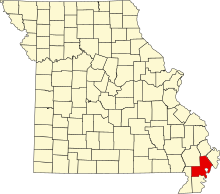National Register of Historic Places listings in New Madrid County, Missouri

This is a list of the National Register of Historic Places listings in New Madrid County, Missouri.
This is intended to be a complete list of the properties and districts on the National Register of Historic Places in New Madrid County, Missouri, United States. Latitude and longitude coordinates are provided for many National Register properties and districts; these locations may be seen together in a map.[1]
There are 10 properties and districts listed on the National Register in the county.
This National Park Service list is complete through NPS recent listings posted April 5, 2024.[2]
Current listings[edit]
See also[edit]
- List of National Historic Landmarks in Missouri
- National Register of Historic Places listings in Missouri
References[edit]
Wikimedia Commons has media related to National Register of Historic Places in New Madrid County, Missouri.
- ^ The latitude and longitude information provided in this table was derived originally from the National Register Information System, which has been found to be fairly accurate for about 99% of listings. Some locations in this table may have been corrected to current GPS standards.
- ^ National Park Service, United States Department of the Interior, "National Register of Historic Places: Weekly List Actions", retrieved April 5, 2024.
- ^ Numbers represent an alphabetical ordering by significant words. Various colorings, defined here, differentiate National Historic Landmarks and historic districts from other NRHP buildings, structures, sites or objects.
- ^ The eight-digit number below each date is the number assigned to each location in the National Register Information System database, which can be viewed by clicking the number.
- ^ Morse, Dan F., and Phyllis A. Morse, eds. The Lower Mississippi Valley Expeditions of Clarence Bloomfield Moore. Tuscaloosa: U of Alabama P, 1998, 156.
- ^ a b c Federal and state laws and practices restrict general public access to information regarding the specific location of this resource. In some cases, this is to protect archeological sites from vandalism, while in other cases it is restricted at the request of the owner. See: Knoerl, John; Miller, Diane; Shrimpton, Rebecca H. (1990), Guidelines for Restricting Information about Historic and Prehistoric Resources, National Register Bulletin, National Park Service, U.S. Department of the Interior, OCLC 20706997.
- ^ a b O'Brien, Michael J., and Robert C. Dunnell, eds. Changing Perspectives on the Archaeology of the Central Mississippi Valley. Tuscaloosa and London: U of Alabama P, 1998.
- ^ Chapman, Carl, et al. "Investigation and Comparison of Two Fortified Mississippian Traditional Archaeological Sites in Southeastern Missouri: A Preliminary Compilation". Missouri Archaeologist 38 Whole Volume (1977).
- ^ Sussenbach, Tom, and R. Barry Lewis. Archaeological Investigations in Carlisle, Hickman, and Fulton Counties, Kentucky: Site Survey and Excavations. Western Kentucky Project Report #4. Champaign: U of Illinois Department of Anthropology, 1987, 2.






